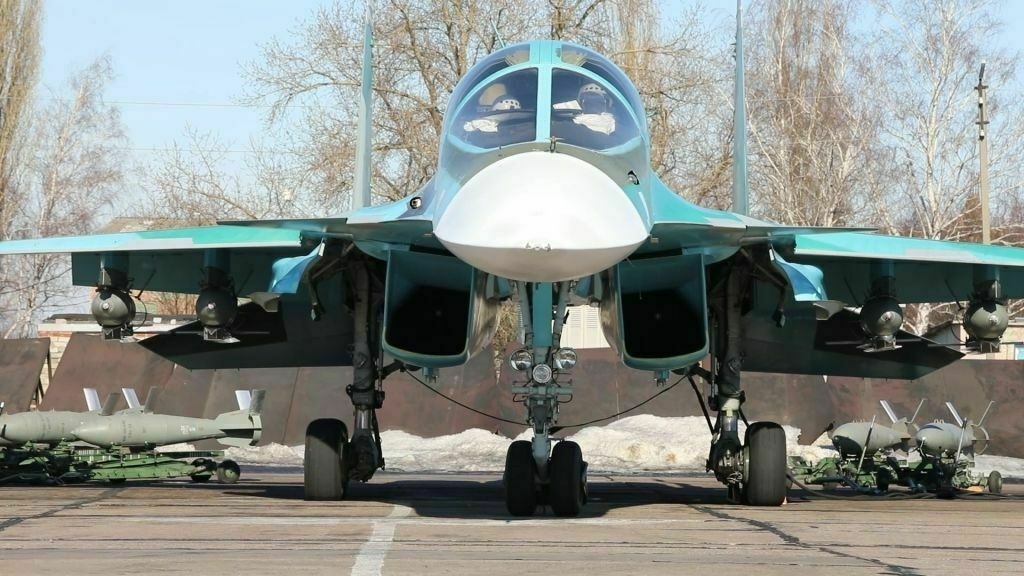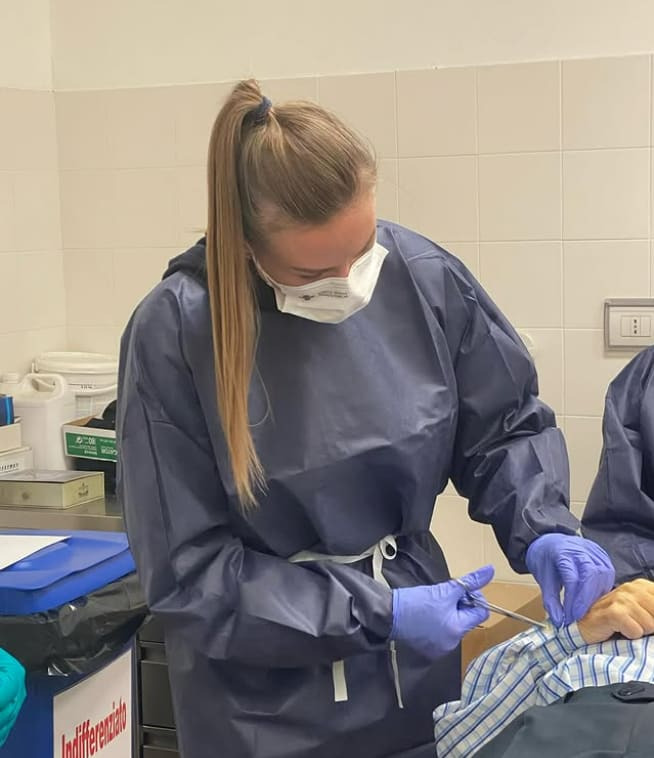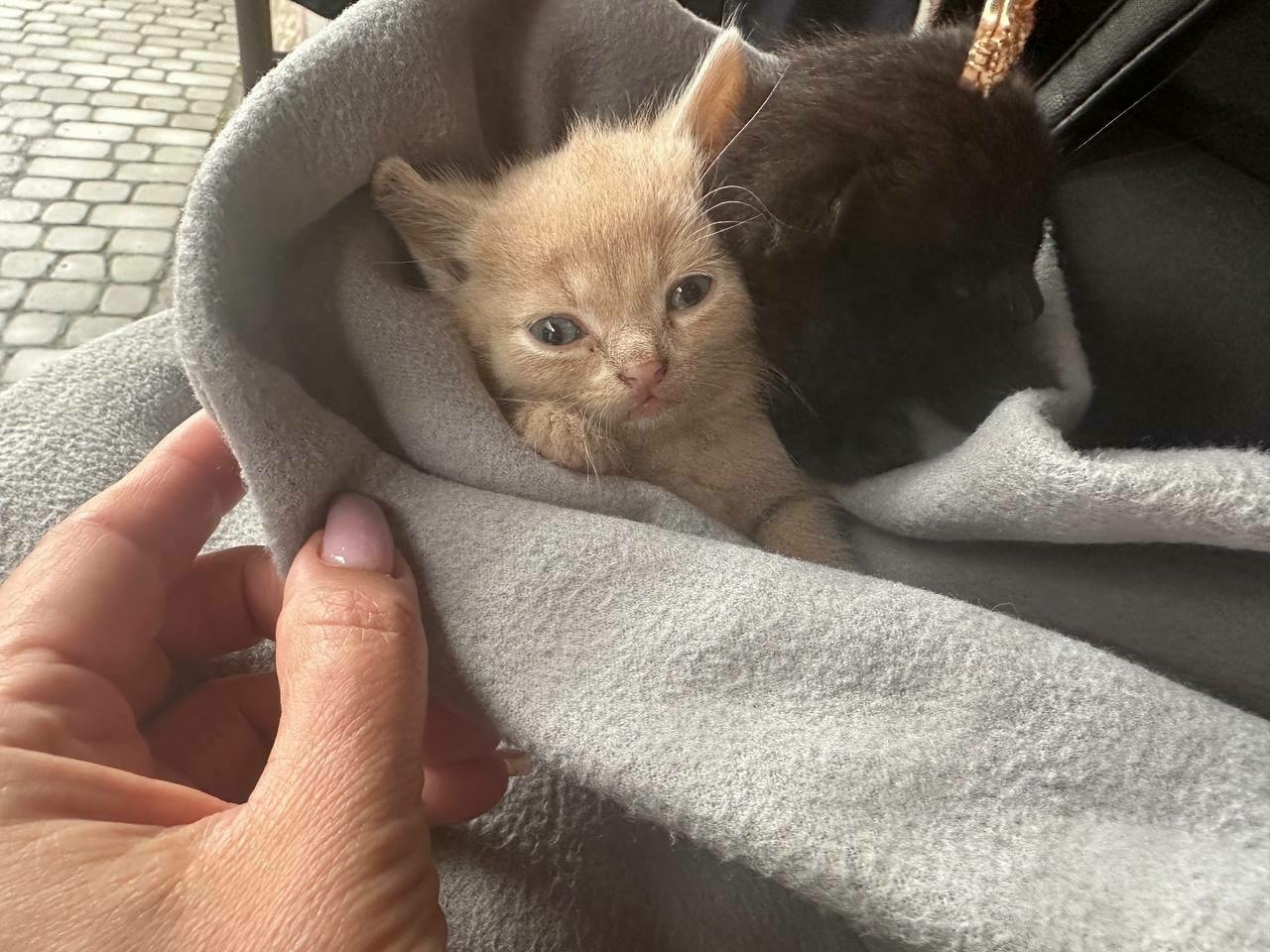-
🔥 15 vehicles destroyed: Ukrainian Forces repel assault near Toretsk – FSB sent to fight
-
Pope Leo says Ukraine 'martyred' in Russia's 'senseless war'

Pope Leo XIV welcomed Ukrainian Greek Catholic pilgrims to the Vatican on June 28, saying their country has been “martyred” by Russia’s “senseless war.”
Greek Catholicism is Ukraine’s second-largest Christian denomination, with adherents making up around one-tenth of the country’s population. Prevalent mainly in western Ukraine, it has retained many rituals and practices of the Orthodox Church while under the pope’s jurisdiction.
“I wish to express my closeness to the martyred Ukraine — to the children, the youth, the elderly, and especially to the families who mourn their loved ones,” Pope Leo said in an address to Greek Catholic pilgrims at St. Peter’s Basilica.
“I share in your sorrow for the prisoners and for the victims of this senseless war."
Sviatoslav Shevchuk, Head of the Greek Catholic Church in Ukraine, was among the pilgrims greeted at the Vatican, along with other bishops, priests, and lay believers. The pilgrimage was made in honor of the Jubilee, a Catholic holy year last observed in 2015-2016. The theme of the 2025 Jubilee is “Pilgrims of Hope.”
In his address, Pope Leo said that the faith of Ukrainians is being “sorely tested” by Russia’s full-scale invasion.
“Many of you, since the war began, have surely asked: Lord, why all this? Where are you? What must we do to save our families, our homes and our homeland?"
The pope also offered a special blessing to mothers of soldiers killed on the front lines in Ukraine.
After Pope Leo’s remarks at St. Peter’s, President Volodymyr Zelensky thanked the pontiff for his support.
Thank you, Your Holiness, for your continued prayers and compassion for Ukraine and our people,” Zelensky wrote on X.
“Together we must stop this wanton Russian aggression and protect innocent lives. A just peace is needed. And we would also deeply appreciate your kind help in bringing back all our people — adults and children — held in Russian captivity against their will."
Pope Leo XIV, formerly Cardinal Robert Prevost, was elected head of the Catholic Church in the conclave on May 8 after the death of his predecessor, Pope Francis. Zelensky met with Pope Leo at his inauguration mass on May 18 and described him as “a symbol of hope for peace.” The two discussed the return of children forcibly deported by Russia and other humanitarian issues.
Pope Leo has called for “a just and lasting peace” in Ukraine and has offered to host peace talks between Kyiv and Moscow at the Vatican — an offer Zelensky has welcomed and Kremlin officials have dismissed.
Early in June, Pope Leo spoke on the phone with Russian President Vladimir Putin, urging Russia to make “a gesture that would favor peace."
The pope’s support for Ukraine has been viewed as a departure from his predecessor Pope Francis, whose legacy among Ukrainians was marred by his at times controversial comments about Russia. In 2024, Pope Francis called on Ukraine to have the “courage” to “raise the white flag” and negotiate with Moscow.
‘Putin cannot stop’ – Estonian foreign minister says war in Ukraine existential for Russian presidentAs Russia continues to intensify its onslaught on Ukraine more than three years into the full-scale invasion, Kyiv faces a new challenge – keeping its Western allies, namely the new U.S. administration, engaged in the struggle. This became clear during the NATO summit in The Hague on June 24-25, whereThe Kyiv IndependentMartin Fornusek
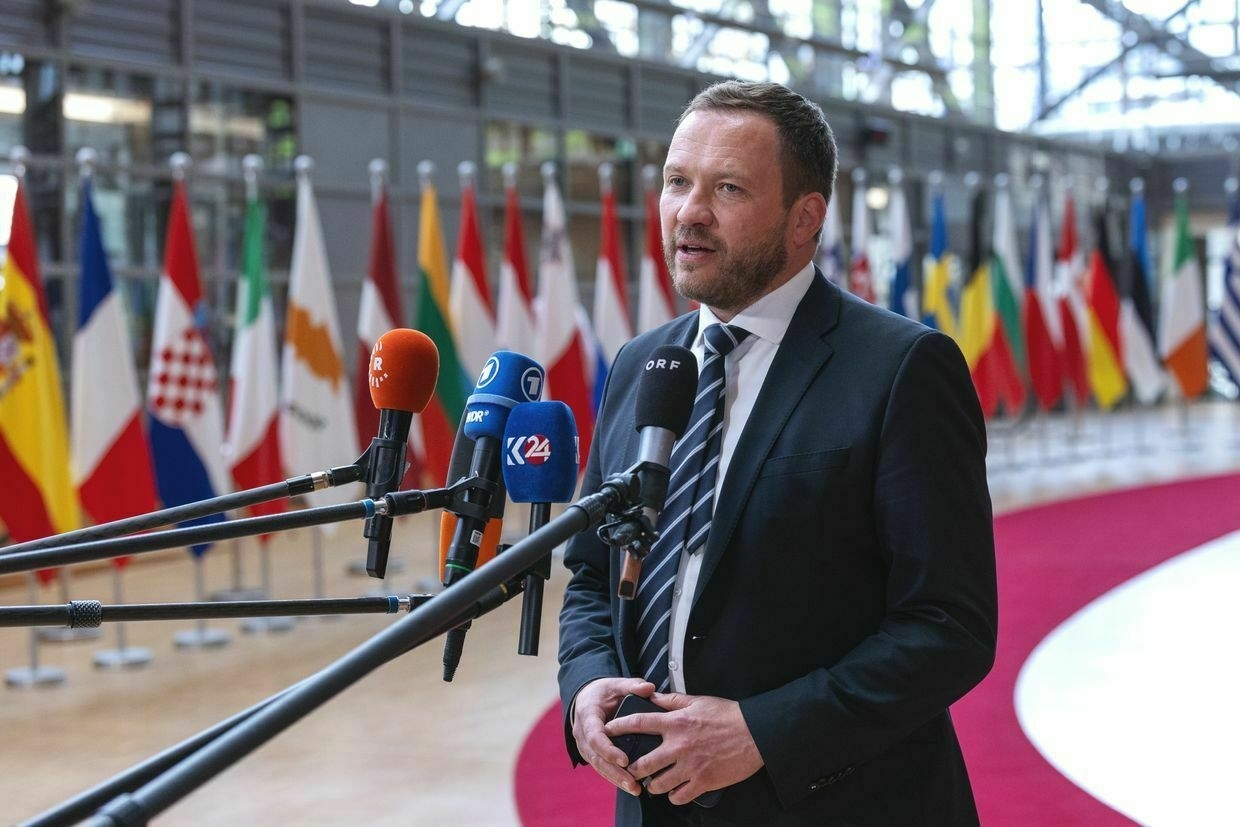
-
Former Kharkiv deputy mayor charged with embezzling funds allocated for defense fortifications
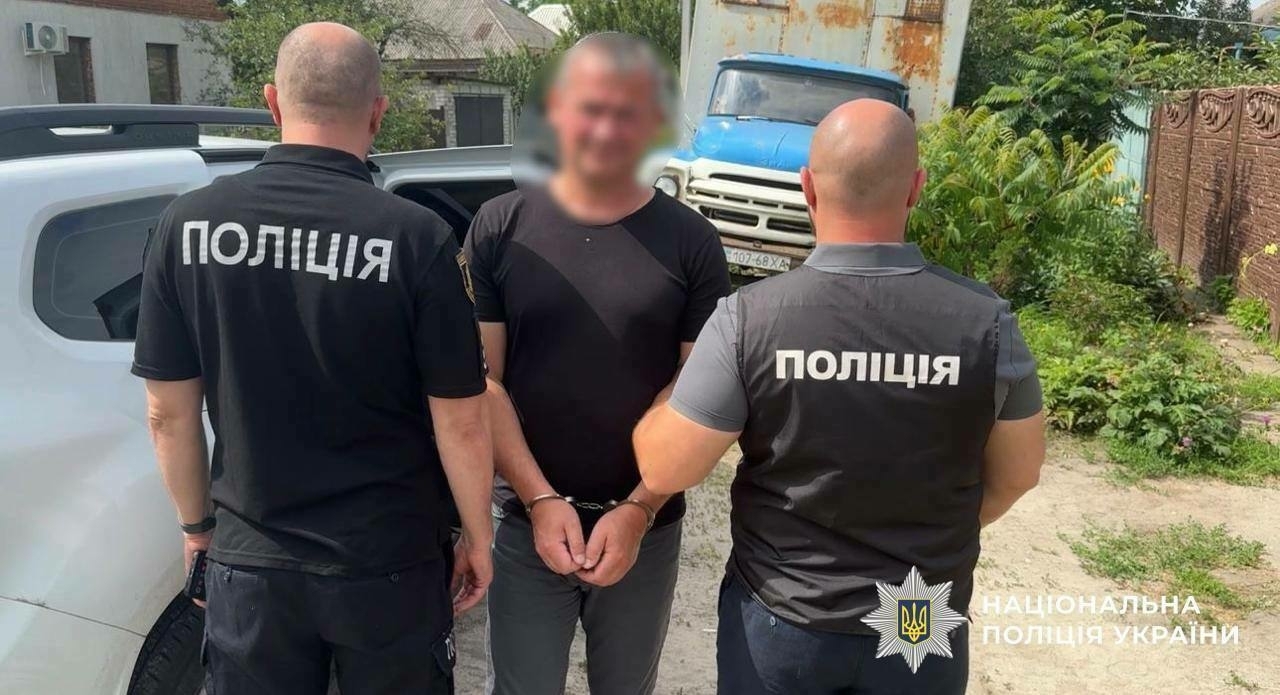
A former deputy mayor for Kharkiv is facing multiple charges related to creating and leading a scheme that allegedly embezzled 5.4 million hryvnias ($130,000) of budget funds allocated for fortifications, law enforcement agencies announced on June 28.
Ukraine’s military as well as public officials has seen several corruption scandals since the start of Russia’s full-scale war, related to illicit enrichment, money laundering, bribery, and misconduct of the command.
A total of four people, including two company heads and two entrepreneurs, were arrested alongside the former official, the National Police said.
The scheme allegedly involved a shell company procuring purchased materials for fortifications at prices over 30% above market value.
While authorities did not name the former official, Ukrainska Pravda reported, citing law enforcement sources, that the suspect in question is Andrii Rudenko, Kharkiv’s Deputy Mayor for Housing and Communal Services between 2015 and 2024.
Authorities did not publicly release the identities of the remaining suspects.
The five suspects are currently facing charges under 17 articles of Ukraine’s Criminal Code, with motions filed to impose pre-trial detention without bail.
It was not immediately clear as to the maximum sentence the suspects may receive if found guilty, however, Ukraine’s Prosecutor General Ruslan Kravchenko said that he will seek for “stolen budget funds must be fully returned to the state."
Law enforcement agents have previously arrested Kharkiv officials with corruption related charges.
In April, authorities charged a total of eight individuals, including local officials and entrepreneurs, accused of colluding with contractors to supply firewood to the military at prices significantly above market value. Several officials and entrepreneurs of housing and utilities departments in several regions, including Kharkiv, were allegedly implicated.
Ukrainian drone strike on Crimea air base destroys 3 Russian helicopters, SBU claimsThe attack destroyed Mi-8, Mi-26 and Mi-28 attack helicopters, and a Pantsyr-S1 self-propelled anti-aircraft missile and gun system, the Security Service of Ukraine told the Kyiv Independent. The Kyiv IndependentKateryna Denisova
The Kyiv IndependentKateryna Denisova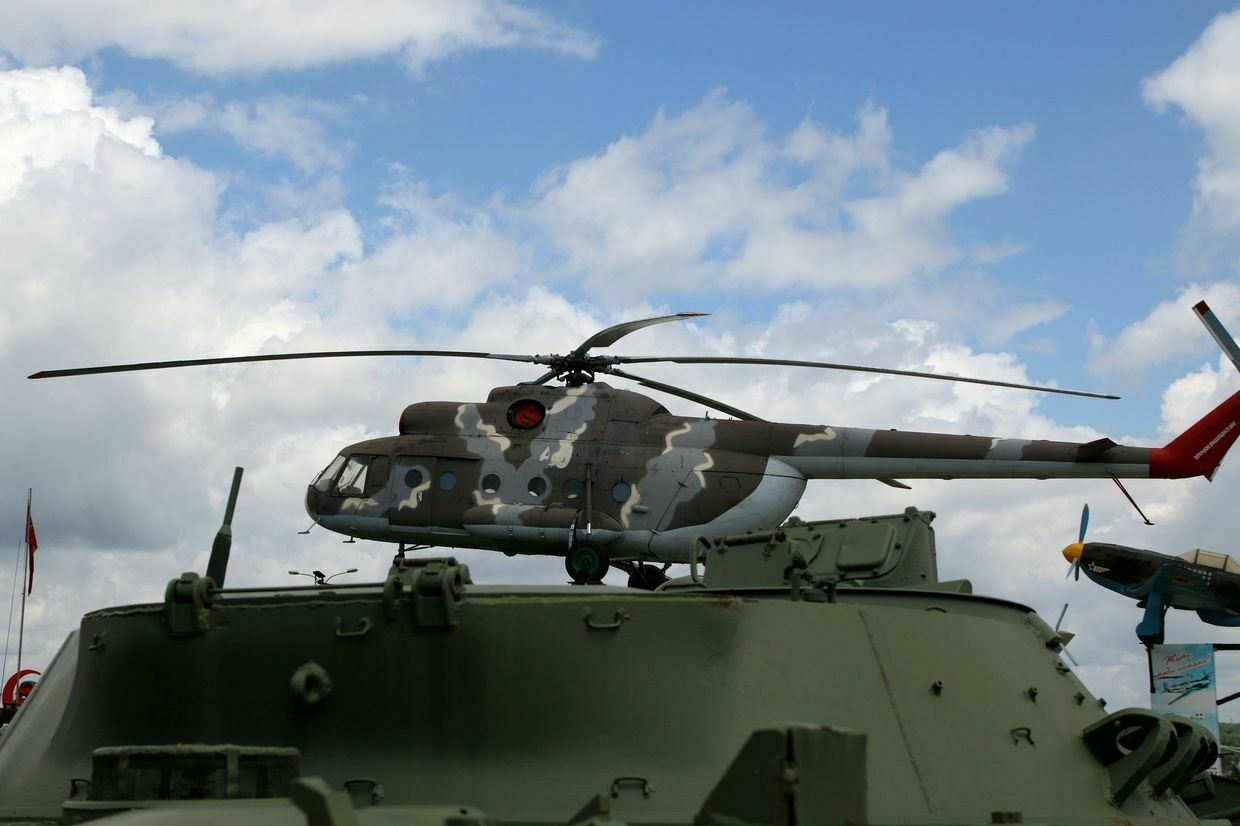
-
New Tactical Group Appears in International Legion
The International Legion for the Defense Intelligence of Ukraine is a diverse formation consisting of many foreign volunteer units on different scales. It was formed on March 7, 2022, in…
-
Ukraine's parliament working on bill to organize post-war elections, speaker says
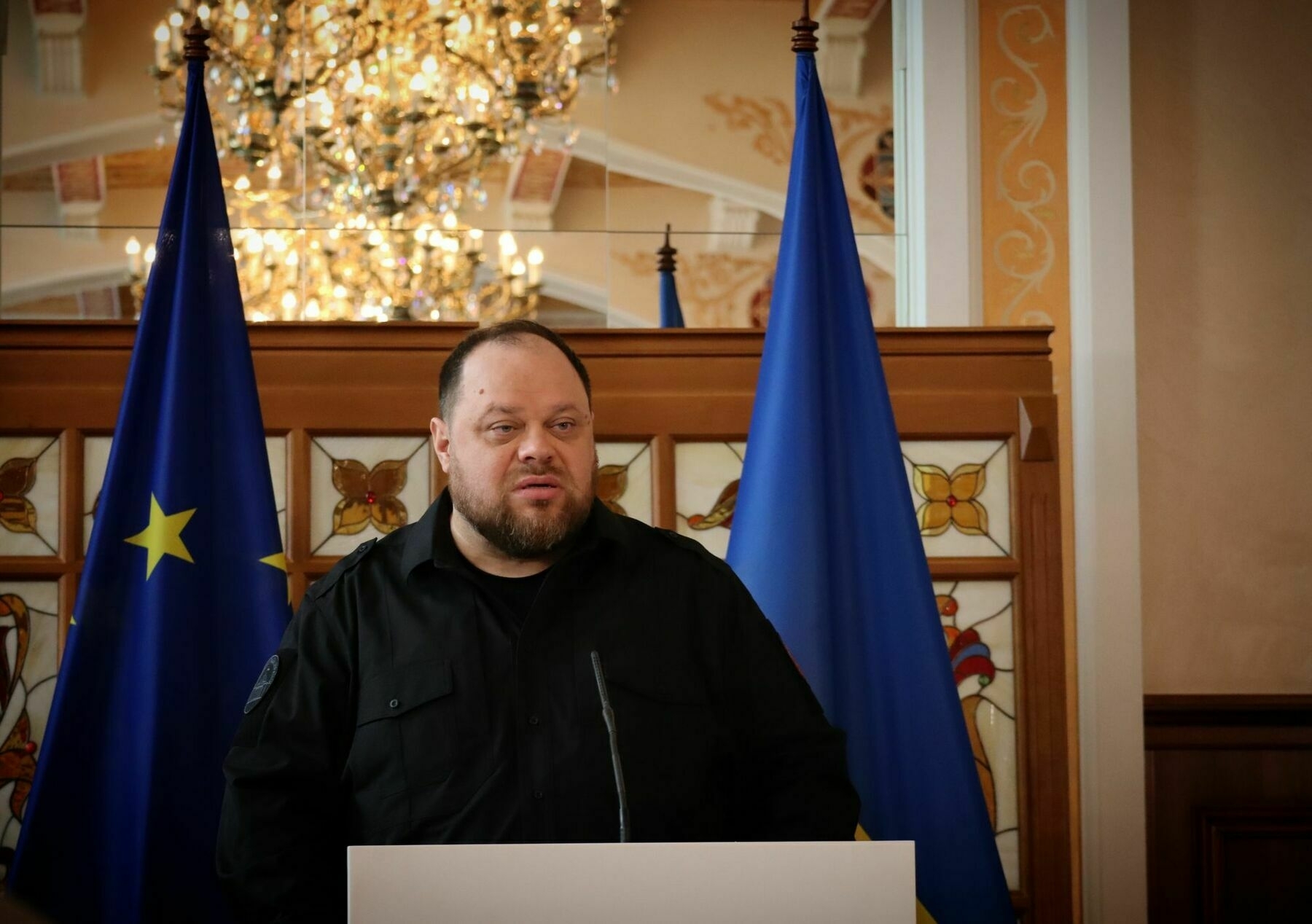
Chairman of the Verkhovna Rada Ruslan Stefanchuk said on June 28 that Ukraine’s parliament is preparing a draft bill to hold elections following the end of the martial law period enacted as a result of the war.
“We are working on this draft law, because for the next elections, a new special draft law is needed that will regulate the so-called post-war elections,” Stefanchuk said on Ukraine’s marathon TV broadcast.
“We are preparing various basic scenarios so that people can exercise their fundamental constitutional right to vote. And this must take place in Ukraine. And I believe we will be able to find the right legislative compromise,” he added.
The reason for separate legislation on a post-war election, Stefanchuk previously said, was due to the fact that Ukraine’s Constitution does not not provide clarity on the details of holding elections following the end of a martial law period.
No details on the bill or timeline for implementation were provided.
Russia’s full-scale invasion and the subsequent declaration of martial law in Ukraine meant elections have been impossible to hold, and President Volodymyr Zelensky’s term has been extended, something constitutional lawyers say is allowed under Ukrainian law.
Despite criticism, Ukraine’s parliament, the Verkhovna Rada, passed a resolution on Feb. 25 to hold elections after “a comprehensive, just, and sustainable peace is secured” in the country.
While polling shows a vast majority of Ukrainian citizens do not support holding elections before a full peace deal, the lack of elections has stirred some controversy with Ukraine’s allies.
At the start of his second term in office, U.S. President Donald Trump urged Ukraine to hold elections — something that Ukraine has thus far refused to do citing the difficulties of holding elections amid active warfare, as well as security implications.
Zelensky has previously said he is willing to step down in exchange for a peace agreement.
Russian propaganda has widely used the issue of elections in Ukraine to discredit the Ukrainian leadership. Mocow has repeatedly claimed that Zelensky is no longer a legitimate president, as his first term was originally meant to end on May 20, 2024.
Russia has amassed 111,000 troops near Pokrovsk, Syrskyi saysPokrovsk remains the “hottest spot” along the front line but “the situation is under control” and Russia has not crossed the administrative border from Donetsk to Dnipropetrovsk Oblast, Commander-in-Chief Oleksandr Syrskyi said.The Kyiv IndependentAbbey Fenbert
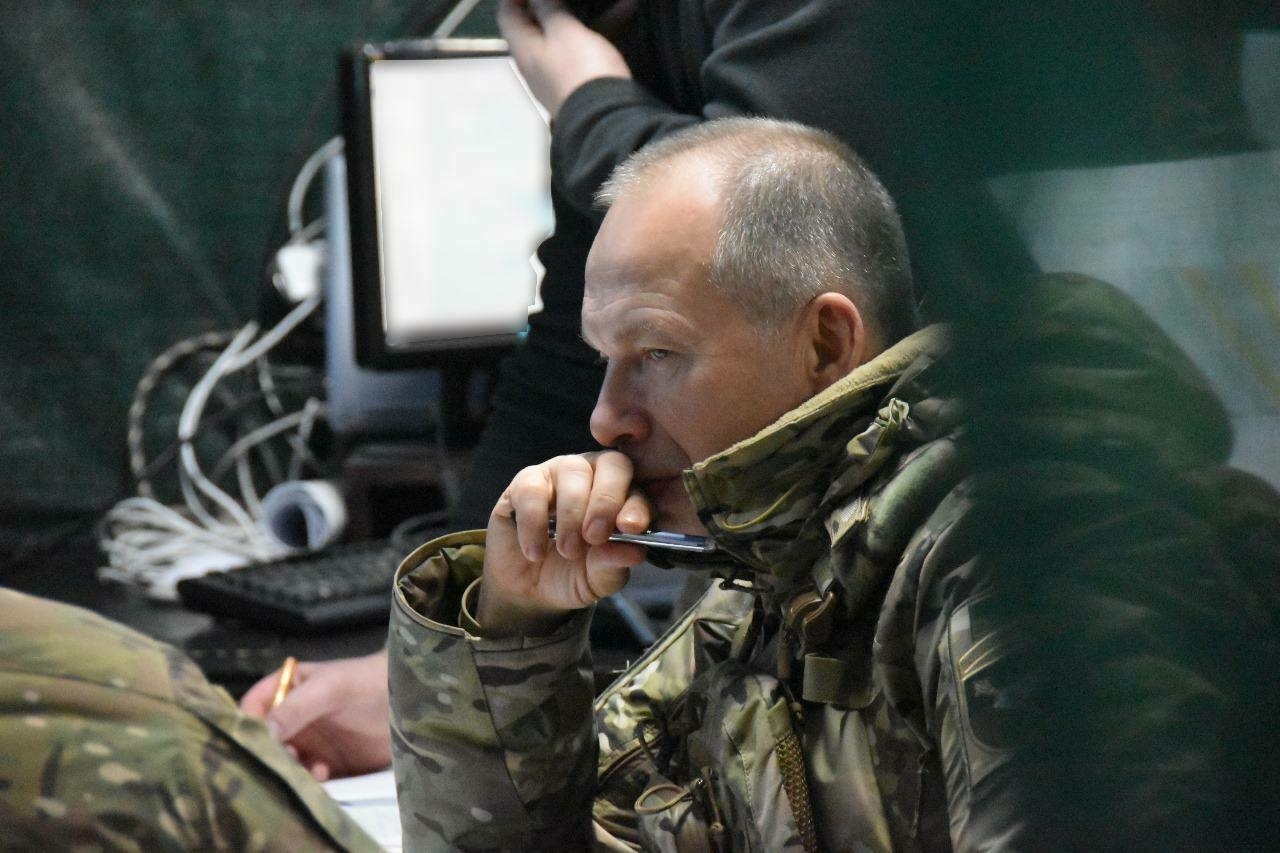
-
Baltic nations withdraw from Ottawa anti-personnel landmine treaty amid rising Russian threats
Two Baltic nations are taking steps to ready themselves against a potential Russian military invasion. These countries have submitted documents to the United Nations announcing their withdrawal from a treaty prohibiting the use of landmines. LRT reported that Lithuania has officially informed UN Secretary-General António Guterres of its decision to exit the Ottawa Convention, which bans the production, transfer, stockpiling, and use of anti-personnel mines. Lithuania's Foreign Minister, Kęstutis Budrys, said that this decision was a difficult but necessary response to the military threats posed by Russia. Budrys stated, "Lithuania harbors no illusions. Putin's Russia poses the most serious and enduring existential threat to Europe. Russia wages war for its political ends, destabilizes the situation, and prepares for prolonged confrontation."
Budrys further emphasized that Lithuania must take all necessary measures to protect its state, residents, and every inch of NATO territory. Despite this move, the minister reiterated Lithuania's commitment to international humanitarian law and civilian protection. Under the established guidelines, Lithuania’s exit from the Ottawa Convention will become effective six months after filing the necessary documents with the UN. On June 27, similar documents were filed by Latvia and Estonia. Estonia's decision to denounce the treaty is informed by lessons learned from Russia's war against Ukraine. As Estonia's Foreign Minister, Margus Tsahkna, stated, the country requires greater flexibility in its choice of defense systems and weaponry.
Tsahkna emphasized, "Ongoing Russian aggression demonstrates that imposing unilateral restrictions, which the adversary does not respect, only puts us in a more vulnerable position. Exiting the convention will provide Estonia's defense forces with more opportunities to enhance security." Nonetheless, like Lithuania, Estonia assures continued adherence to international humanitarian law, civilian protection, and participation in humanitarian demining and assistance programs for conflict victims. It should be noted that Lithuania's Parliament had approved the exit from the Ottawa Convention back in May, followed by the president's endorsement of this decision. In March, plans for a collective withdrawal from the treaty were announced by all Baltic states, alongside Poland and Finland.
-
Ukrainian drones strike missile, drone arsenal in Russia's Bryansk Oblast
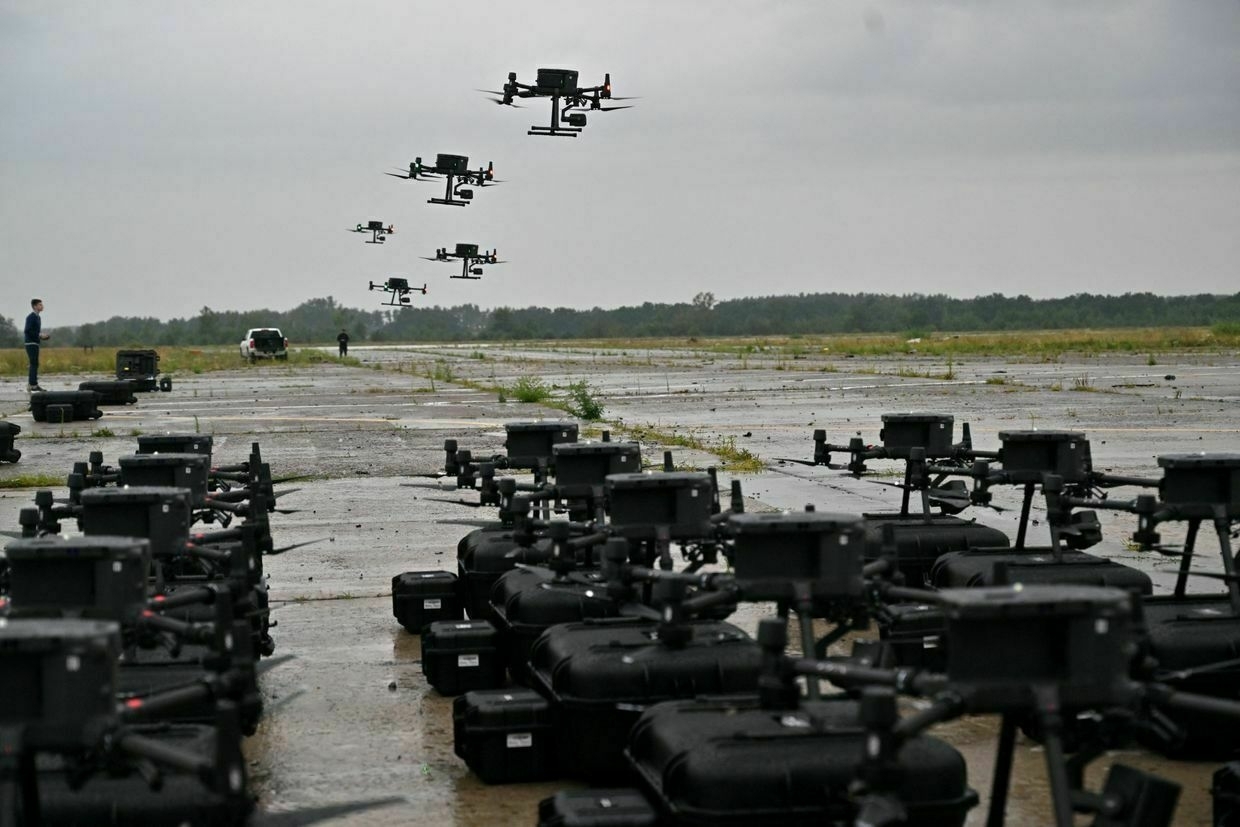
Editor’s note: This is a developing story and is being updated.
Ukraine’s military intelligence (HUR) struck on June 28 the 1060th Material-Technical Support Center in the city of Bryansk, Ukraine’s General Staff said.
The facilities store a Russian missile and drone arsenal, Ukrainska Pravda reported, citing a source in HUR.
Local residents reported hearing explosions and gun fire throughout the morning of June 28. Pictures posted on social media show smoke billowing from the area of where the centre, formerly the the 120th arsenal of the Main Missile and Artillery Directorate, is located in an industrial area in the southern part of the city.
The General Staff said it was assessing the strike as extent of the damage was not immediately clear.
Bryansk Oblast Governor Alexander Bogomaz acknowledged a drone attack on the region overnight claiming that four civilians were injured in the attack, damaging ten homes and a vehicle.
Later in the morning, Bogomaz claimed that all the drones had been downed by Russian air defense unit in a separate attack, claiming that no damage had been inflicted. He did not mention the Main Missile and Artillery Directorate in his comments.
The Kyiv Independent cannot immediately verify the reports or claims made by Russian officials.
Bryansk Oblast, located in Russia’s far-west, borders Ukraine’s Chernihiv and Sumy Oblast, and has been the target of various Ukrainian strikes.
Ukraine’s military regularly conducts strikes onto Russian and Russian-occupied territory.
Drones operated by the Security Service of Ukraine (SBU) struck the Kirovske military airfield in occupied Crimea overnight on June 28, the SBU told the Kyiv Independent. The attack destroyed Mi-8, Mi-26 and Mi-28 attack helicopters, and a Pantsyr-S1 self-propelled anti-aircraft missile and gun system, the SBU claimed.
Ukrainian drone strike on Crimea air base destroys 3 Russian helicopters, SBU claimsThe attack destroyed Mi-8, Mi-26 and Mi-28 attack helicopters, and a Pantsyr-S1 self-propelled anti-aircraft missile and gun system, the Security Service of Ukraine told the Kyiv Independent. The Kyiv IndependentKateryna Denisova
The Kyiv IndependentKateryna Denisova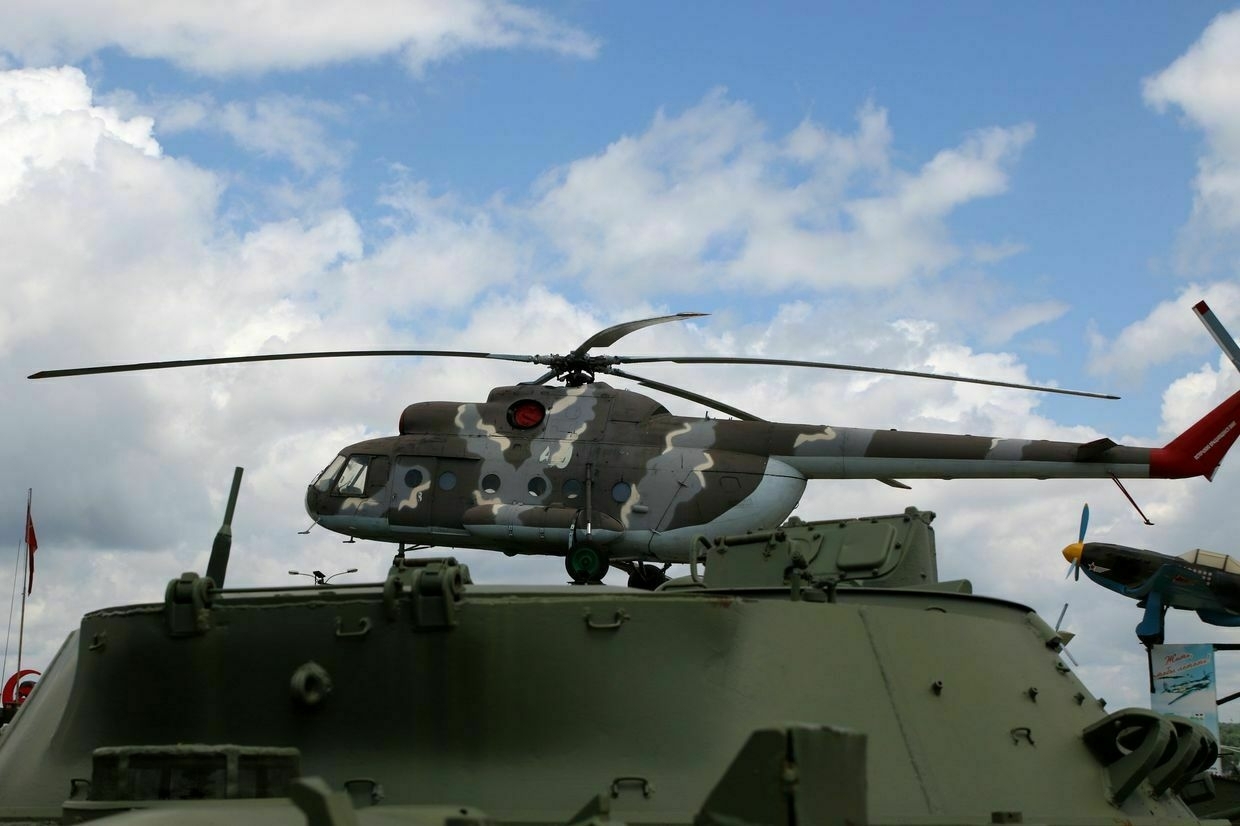
-
Russia revives decommissioned T-62 tanks as armored vehicle losses mount in Ukraine
Russia is re-deploying outdated tanks to the Ukraine front after suffering significant losses of more modern armored vehicles, according to Ukrainian intelligence. The Russian army is reportedly bringing obsolete T-62 tanks—first developed in the 1960s—back into action as a temporary fix after newer equipment was depleted on the battlefield. The capacity of T-72B3M and T-90M tanks, prominent in the early stages of the invasion, is rapidly declining.
While production of new tanks continues, it's constrained by limited manufacturing capacity and a shortage of essential components, especially high-tech parts previously sourced internationally. To address pressing gaps in its armored fleet, Russian military leadership is resorting to "reactivating" T-62 tanks, left to rust for decades, often in the open air.
These tanks are primarily restored at the 103rd Armored Repair Plant in Atamanovka, Transbaikal region. Ukrainian intelligence notes that the technical condition of these vehicles is far from ideal. Stored since the Soviet era without major repairs or proper maintenance, many tanks have been neglected. However, faced with a severe shortage of armored vehicles, Russia is willing to tap into even these older resources.
Recently, Ukrainian intelligence reported the transfer of a batch of 21 T-62 tanks from the Eastern Military District to the western part of Russia. After minimal refurbishment, these units could be deployed to the Ukrainian front lines. T-62s are utilized not just as combat units but also as stationary firing points to bolster defensive positions in occupied territories, essentially turning them into immobile fortifications and artillery platforms.
-
Why is Hungary saying “no” to Ukraine’s EU membership?
-
German Chancellor Merz rejects dialogue with Putin, citing ineffectiveness in resolving Ukraine conflict
Germany’s Chancellor, Friedrich Merz, has stated he’s not planning to reach out to Russian President Vladimir Putin anytime soon, marking a shift from previous leadership approaches. Merz believes direct talks with Putin hold little promise and aims not to repeat his predecessor's missteps. According to DW, past interactions with Putin have failed to ease tensions surrounding the Ukraine conflict.
In an interview with Süddeutsche Zeitung, Merz pointed to Hungarian Prime Minister Viktor Orban's visit to Moscow in July 2024, as well as former Chancellor Olaf Scholz's phone call with Putin. "Following Orban’s latest Russia visit, Kyiv suffered heavy bombardments, with residential areas and hospitals bearing the brunt. After Scholz's conversation with Putin, Russia struck a children's hospital. If such talks lead to these 'results,' I’d keep my distance for quite some time," the Chancellor emphasized.
Merz also commented on U.S. President Donald Trump's stance on Russia, suggesting that the American leader is becoming increasingly critical of Putin. The German Chancellor noted the broad understanding in Europe regarding the war's essence and highlighted the current U.S. Senate discussions on potential new sanctions against Russia. President Trump, Merz indicated, will make the final decision.
On November 15, 2024, former Chancellor Scholz conversed with Putin, condemning the war Russia waged against Ukraine. However, shortly after, Russian assaults on Ukrainian cities intensified, making it evident their dialogue fell short of achieving its goal. Dialog.UA previously reported Merz’s reaction to the Kremlin leader's comments on "our Ukraine."
-
Slovak PM sees 'no reason' to meet with Zelensky, claims Ukrainian president 'hates' him, after reportedly blocking Russian sanctions
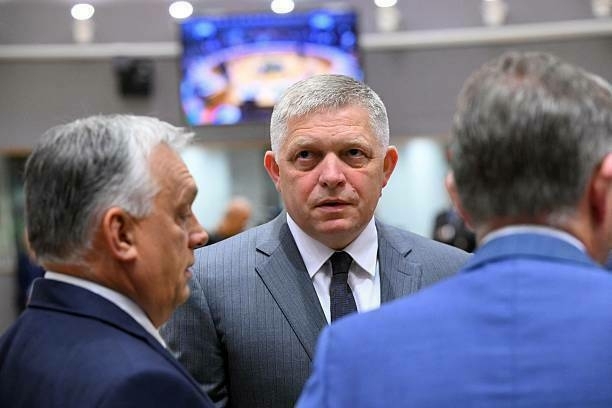
Slovak Prime Minister Robert Fico said on June 28 that he does not intend to meet directly with President Volodymyr Zelensky, claiming that the Ukrainian president “hates” him, as relations between the two countries continue to sour.
Fico’s comments come just one day after Slovakia joined Hungary in blocking an 18th package of sanctions against Russia, an unnamed EU official told the Kyiv Independent. Unlike Hungarian Prime Minister Viktor Orban, who has consistently opposed sanctions against Russia, Slovakia has not previously attempted to block EU sanctions.
“I see no reason to meet with the Ukrainian president,” Fico told Slovak broadcaster STVR, stressing he has better relations with Ukrainian Prime Minister Denys Shmyhal. “My meeting with President Zelensky has no significance because he hates me,” he added.
Fico’s comments on a potential meeting refer to talks on improving bilateral relations between the two countries, including in areas of Ukraine’s EU accession as well as additional sanctions on Russia.
“I’m the Prime Minister of the Slovak Republic, and my task is to do everything to ensure that gas prices in Slovakia do not rise because of Ukraine,” Fico told STVR, in reference to concerns over Slovakia’s reliance on Russian gas and energy exports that were allegedly not addressed in the 18th sanctions package.
Slovakia has requested that the adoption of the 18th package of EU sanctions against Russia be postponed until a decision is made on the consequences for the member states from RePowerEU, the European Commission’s initiative to end dependence on Russian fossil fuels by 2030 in response to Russia’s invasion of Ukraine.
EU foreign policy decisions, including sanctions, require unanimous approval by all member states. A Slovak veto could continue to force concessions or delay enforcement in future rounds.
Despite the criticism, Fico added that “Ukraine’s EU membership brings more advantages than disadvantages for Slovakia,” but stressed that other officials, including Slovakian President Peter Pellegrini would handle discussions with top Ukrainian leadership.
Since taking office in 2023, Fico has also reversed Slovakia’s previous pro-Ukraine policy, ending military aid to Kyiv and questioning the value of EU sanctions on Russia.
Zelensky has not responded to Fico’s claims.
EU fails to adopt new Russia sanctions due to Hungarian, Slovak opposition, source saysUnlike Ukraine-skeptic Hungarian Prime Minister Viktor Orban, Slovakia has not previously attempted to block EU sanctions. The Kyiv IndependentKateryna Hodunova
The Kyiv IndependentKateryna Hodunova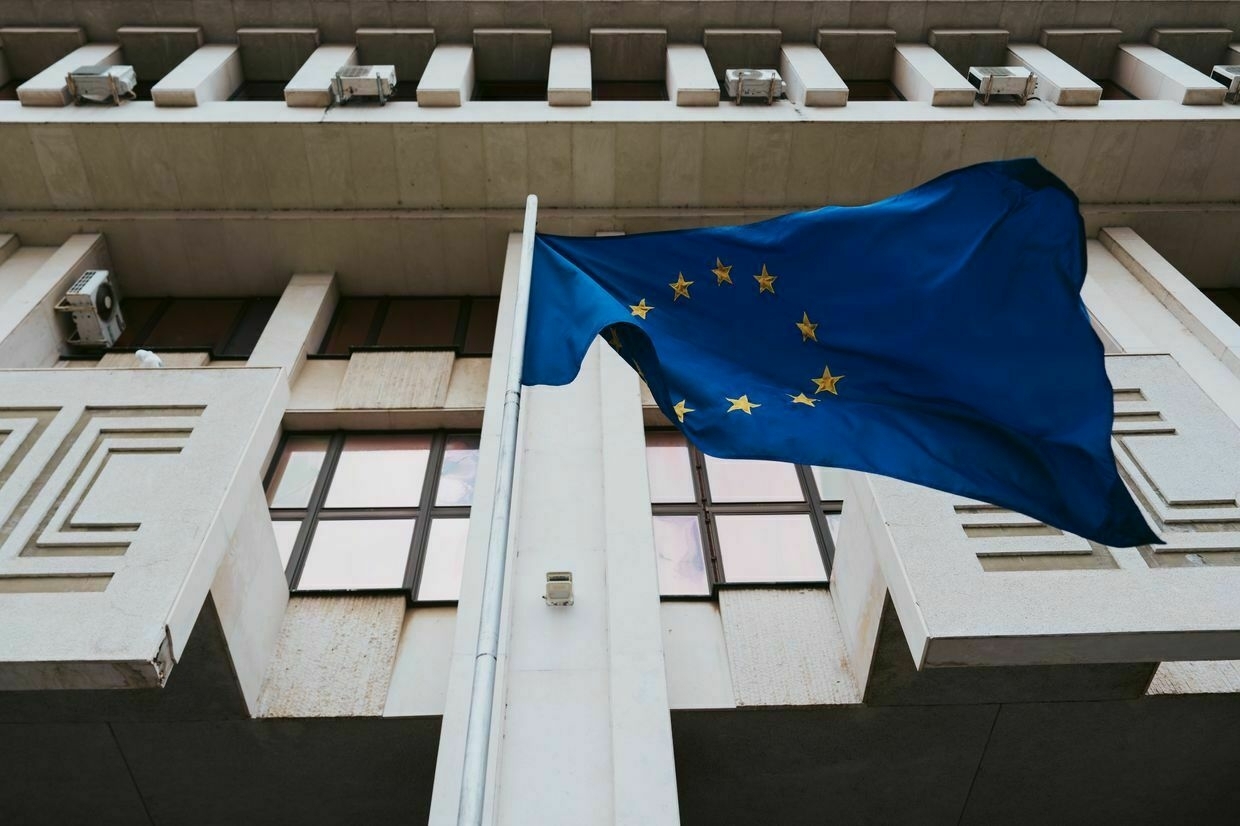
-
Ukrainian drones strike Russian ammunition and weapons depot in Bryansk
In the early hours of Saturday, June 28, the Russian city of Bryansk was rocked by a series of explosions, reportedly from an attack by Ukrainian drones.
According to a source within Ukrainian intelligence, cited by the Ukrainian news agency Suspilne, the strike was conducted by attack drones of the Main Directorate of Intelligence on Ukraine's Constitution Day, aiming at the 120th arsenal of the Main Missile and Artillery Directorate of the Russian Ministry of Defense. The extent of the damage is still being assessed. Officials from Bryansk region have yet to comment on the incident.
This marks the second strike on the arsenal. In November of the previous year, Ukrainian drones targeted ammunition depots at the 1060th logistics support center. More recently, on June 5, Ukrainian forces, alongside SBU fighters, attacked a concentration area of the 26th Russian Missile Brigade in the Bryansk region, destroying three "Iskander-M" launch installations.
The assault also resulted in the death of eight Russian soldiers and the injury of five others. As of now, Russian authorities have not issued a statement regarding this drone attack.
-
Ukrainian drone strike targets Russian airfield in Crimea, destroying helicopters and air defense systems
Ukraine's Security Service (SBU) carried out a drone strike on Krymsk military airfield in Crimea, reportedly destroying three Russian helicopters — the Mi-28, Mi-8, and Mi-26 — along with the self-propelled anti-aircraft system "Pantsir-S1". This operation, which occurred under the cover of darkness on Saturday, June 28, also included the obliteration of a Pantsir-S1 air defense system, valued at approximately $15 million, reports the agency's press service.
The Ukrainian drones targeted critical sites within the airfield, including ammunition storage and the deployment areas of Russian strike aircraft and reconnaissance drones, resulting in secondary explosions of munitions. This tactical maneuver follows an earlier multi-airfield assault on Russian territory, conducted on June 1, where Ukrainian drones simultaneously attacked four Russian military airstrips: Olenya, Belaya, Dyagilevo, and Ivanovo.
According to SBU head Vasyl Maliuk, who directly oversaw "Operation Web," Ukraine successfully neutralized 34% of Russia's strategic cruise missile carriers in these daring drone assaults, damaging aircraft estimated to be worth around $7 billion.
Overall, Maliuk confirmed hits on 41 strategic Russian aircraft. However, U.S. intelligence suggests more conservative numbers, stating that 20 planes were affected, with as many as ten reportedly destroyed.
-
"Ukraine is and will be" – Zelenskyy’s powerful Constitution Day speech
-
Germany reportedly scrambles fighter jets to intercept Russian spy plane over Baltic Sea
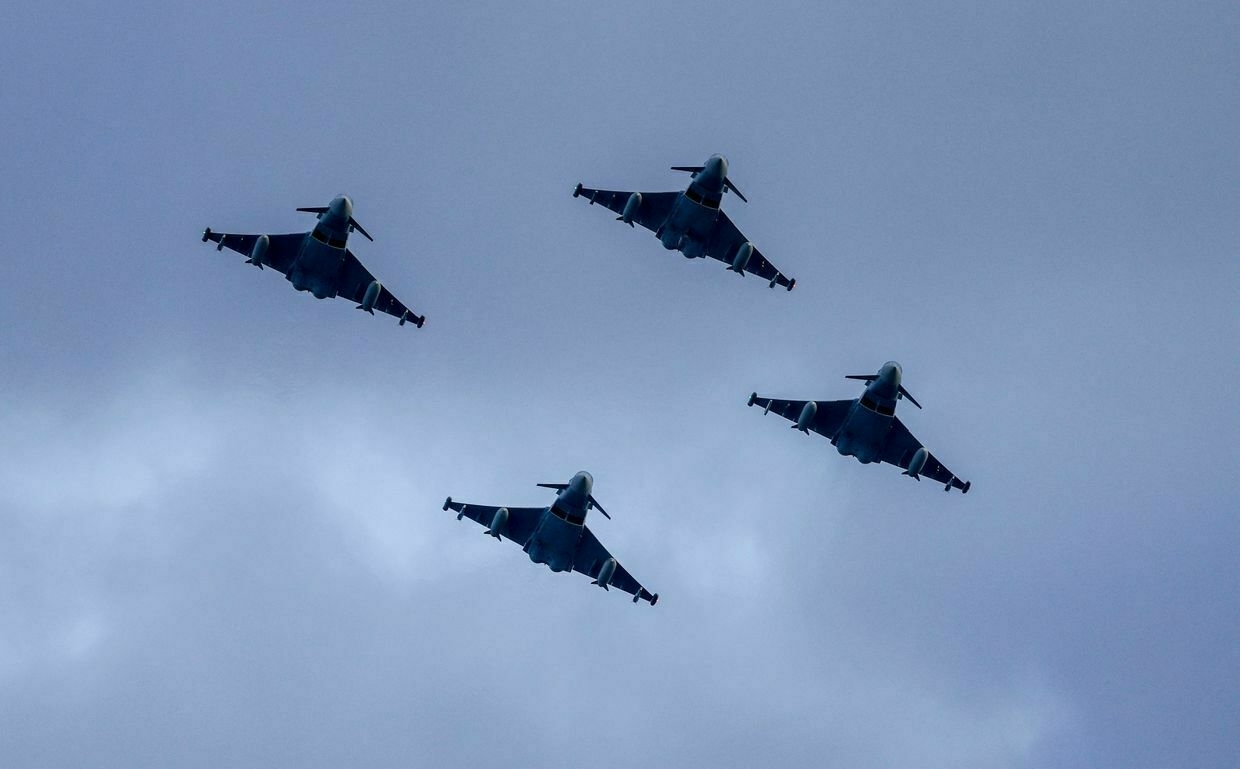
German fighter jets were scrambled to intercept a Russian Il-20 reconnaissance aircraft over the Baltic Sea near NATO airspace on the morning of June 27, the German tabloid Bild reported.
The incident adds to a series of aerial provocations reported by NATO allies since the start of Russia’s full-scale invasion of Ukraine in 2022 as Moscow is suspected of using the aircraft to spy on the alliance’s positions.
The Russian Il-20M, which took off from Kaliningrad with its transponder switched off, was headed west toward international airspace near Poland and Germany when it was detected by NATO radar systems.
NATO alerted the German Armed Forces’ Quick Reaction Team (QRT), prompting the launch of two Eurofighter jets to intercept the aircraft.
The German jets made visual contact with the Russian plane approximately 100 kilometers off the German coast and took a photograph of it. Despite the interception, the Il-20M did not alter its course.
The Russian aircraft eventually veered north, just 40 kilometers from the Baltic Sea island of Usedom, avoiding a breach of German airspace.
According to Bild, this was the ninth such interception mission conducted by German forces in 2025.
As Russia continues its aggression against Ukraine and poses an increasing threat to NATO, German Chancellor Friedrich Merz said in an interview with Süddeutsche Zeitung published on June 27 that he would refrain from phone calls with Russian President Vladimir Putin given the intensified attacks on Ukraine.
Merz’s predecessor, Olaf Scholz, was the first EU leader from a country supporting Ukraine to resume direct contact with Putin since the start of the full-scale invasion, speaking with him by phone in November 2024.
Ukrainian drone strike on Crimea air base destroys 3 Russian helicopters, SBU claimsThe attack destroyed Mi-8, Mi-26 and Mi-28 attack helicopters, and a Pantsyr-S1 self-propelled anti-aircraft missile and gun system, the Security Service of Ukraine told the Kyiv Independent. The Kyiv IndependentKateryna Denisova
The Kyiv IndependentKateryna Denisova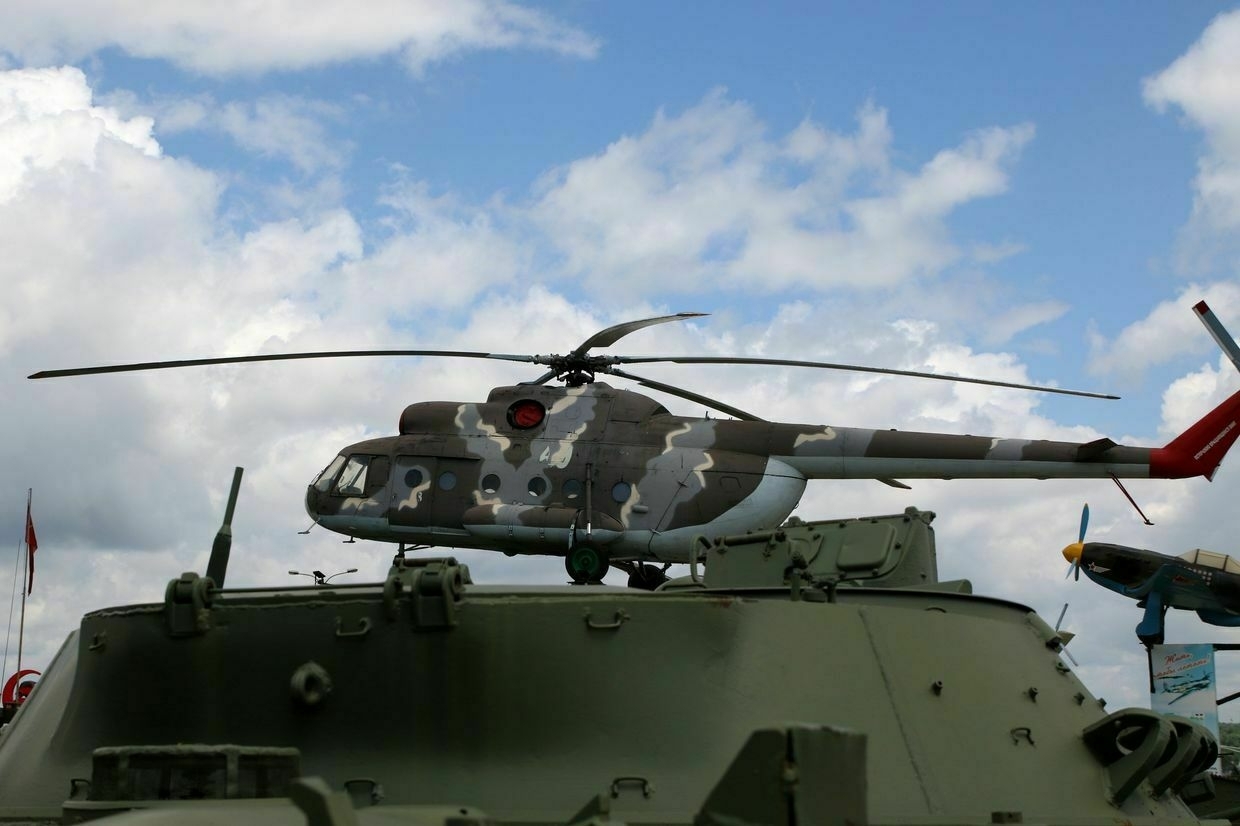
-
The most heart-wrenching job in Ukraine
Editor’s Note: We’re raising funds to get every member of The Counteroffensive team a sleeping bag, foldable cot, ear plugs and eye mask so they can get some sleep amid these dramatically increasing attacks in Kyiv.
We also cover every member of our team and their mental health therapy sessions. Support us now if you agree with our approach.
DISCLAIMER: This story includes descriptions and images which may be disturbing for some readers.
“Masha, get up. Masha, don't sleep, get up!”
The mother’s scream over her child’s coffin will echo in Olena’s mind forever.
Olena is far from being the most emotional person in the room. After all, working with the dead is what she does.
Her job is to hide the traces of war on the dead children's faces, to make it look as if the child had simply fallen asleep, rather than having been hit by a Russian missile.
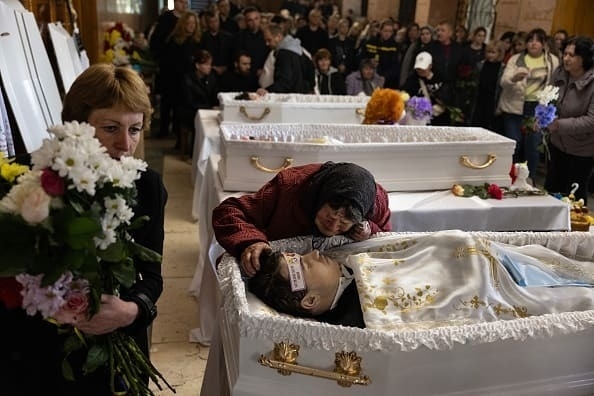
A grandmother says goodbye to her grandson, Roman Martyniuk, 17, who was killed along with his siblings Tamara and Stanislav when Russia launched a massive aerial attack on May 25th. (Photo by Paula Bronstein/Getty Images). Olena arrives at the funeral home ‘Ceremonial’ in Dnipro, puts on gloves and a disposable jumpsuit, and heads to the assigned child-sized coffin.
“It is not easy. But it allows people to say goodbye in an open coffin,” she said. “It's nice to hear the words… ‘She looks like she's just sleeping.’ That means I did my job well.”
Russia has killed at least 631 children and injured nearly 2,000 since the start of the full-scale invasion. The Kremlin has long been targeting bomb shelters marked ‘children,’ most famously at Mariupol’s theater in 2022, which was specifically marked with the word ‘children.’
In the past three months, Russia has killed 15 children and wounded more than 100. In addition, Russia is stepping up its drone attacks on Ukrainian cities. In two weeks in June, the number of drones launched equaled what would normally take place over months.
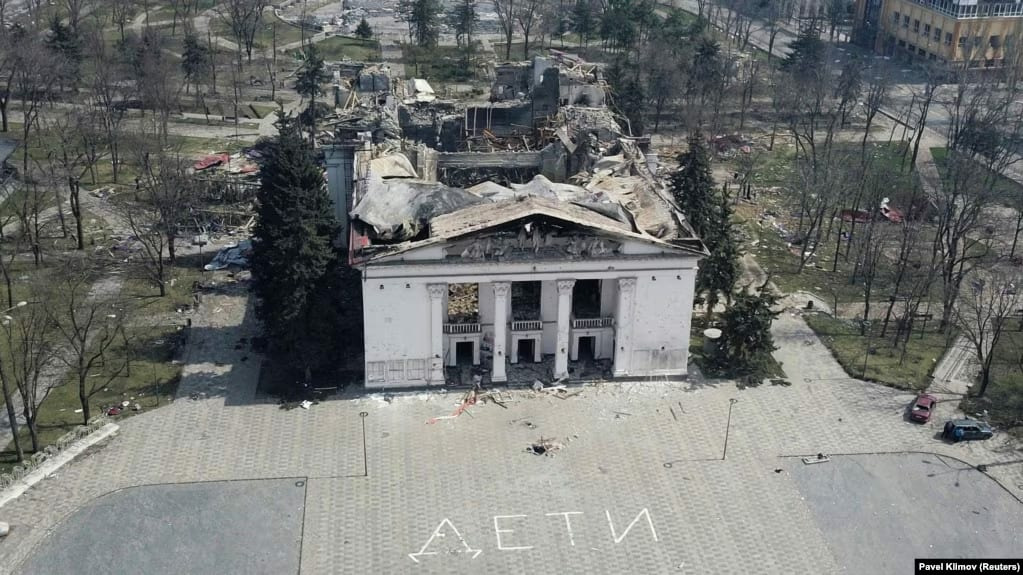
The Drama Theater in Mariupol on April 10, 2022 after it was bombed. The word ‘children’ was written in large letters on the square in front of the theater. Photo Pavel Klimov/Reuters. The ongoing war has forced Ukrainians to find ways to preserve the memory of the dead, in particular their children, by ensuring they receive a proper burial. The care for society’s most innocent – the youngest among us – says something not only about Ukraine’s views towards children, but also the way they view the vulnerable more broadly.
People who work with the war casualties every day, such as Olena, have no time to be scared or to grieve: they must continue to work for over tiny coffins.
Olena Holotsvan is one of the few thanatopractitioners (a person who restores traumatized faces before burial) in Ukraine. She has been working for more than six years, restoring the facial features of the deceased to prepare the bodies for the burials.
"I work with the skin on the outside and inside,” she said. “I do this so that relatives are not afraid to look at their deceased loved ones in the coffin. This is very important for them, especially for parents who are saying goodbye to their children.”
Her workplace resembles a small operating room. In the middle of the room stands a table with a body lying on it, surrounded by various instruments and cosmetics, which Olena uses to restore the shape of the face and the skin color. If the body is delivered quickly after death, and it is not badly damaged, the work will take a maximum of 90 minutes.
Olena has been intrigued by the morgues ever since she was a child, though she can’t explain why. When she was 30 years old, a friend offered to take her to one, and Olena could not refuse.
Fascinated by the experience, she later enrolled in courses to not only be able to perform autopsies, but also restore the faces of the deceased. That's how her career in the morgue began.
Before the full-scale invasion, bodies mostly just needed cosmetics. Yet, amid receiving bodies that have been hit by Russian drones and missiles, she needs to spend more time in restoration, as she has to cover deep cuts and hide burns.
“It is important for parents to see the body and face of their deceased child,” clinical psychologist Yana Hryvchuk told The Counteroffensive. “That is why it is important to bury them in an open coffin, otherwise a person may not accept the death of their child and live their whole life hoping that their child is still alive.”
Since the start of the invasion, Olena’s focus shifted to treating children killed by Russian attacks. In this way, Olena does more than just a mechanical task; she’s more than just a cog in the machine of burial. She helps people find closure.
In Ukraine, it is customary to bury people in an open coffin. This allows people to say goodbye to the deceased by kissing or touching them one last time.
Closed coffins are used in rare cases when the body has been severely damaged in serious accidents. This can cause relatives to doubt whether it is really their loved one who has died. Such doubts arise especially when it comes to bodies that are traumatized beyond recognition.
A man collapses to the ground after the body of a boy was recovered from the rubble of a building in Kyiv. His parents had been hoping for his rescue all day, on June 17, 2025. Video by TSN.
Olena remembers vividly January 14, 2023, when Russians hit a residential building in Dnipro with a ballistic missile, destroying every floor of the building, and killing over 10 people.
She rushed to the funeral home with her friend Anna Gryshyna and her husband, who were there as volunteers.
"Six children died. Another 11 people are still missing because their bodies simply evaporated from the heat after the explosion. And then we at the agency decided that everyone who came to us for burial would be buried free of charge, in nice lacquered coffins, with all the necessary services," Anna told The Counteroffensive.
The first to contact their funeral home that day was Masha's mother. Masha was a 15-year-old girl who died after Russia hit the building that January. Anna took care of the funeral arrangements, while Olena prepared the body.
Preparations for the funeral usually take about three days. During this time, the parents choose a coffin and other items they believe their child would have liked, Anna recalled:
“Almost all parents behave the same way. They focus all their attention on details and every little thing. It's as if they are planning a surprise for their child's birthday, only in reverse.”
Parents usually choose a white coffin for their child, to represent the bright memory of their child.
“For parents, organizing a funeral involves rituals that allow them to gradually accept their loss. At the same time, it is an opportunity to create a place of remembrance where they can come and remember their child,” explained Yana Hryvchuk.
Olena is not typically an emotional person. “It makes no difference to me whether I work with children or adults. The only thing is that children have better skin, so it's a little easier to work with them,” Olena said.
To keep her mind going throughout the day, Olena reminds herself that it is not her fault the child is dead.
In addition, she tries not to talk to relatives of the deceased, to avoid seeing their emotions toward the child who, just a few days ago, was sitting in a school class or playing in a kindergarten playground.
But when Olena was working with 15-year-old girl Masha, things didn't go as planned. Masha was lying in a coffin with her makeup done. Olena, after concluding her work, was getting ready to leave when Masha’s mother entered the funeral hall.
Masha’s mother fell to her knees in front of the coffin and began to scream. She couldn't believe that her daughter had died. The woman didn't get up and continued screaming for over an hour.
"I realized that a tragedy had occurred. And these are the consequences of what is happening. When you live in a war, it becomes blurred; you get used to everything," Olena said. But at that moment, I realized that the war and its consequences were close by.”
The most challenging part of any funeral is when they close the lid of the coffin.
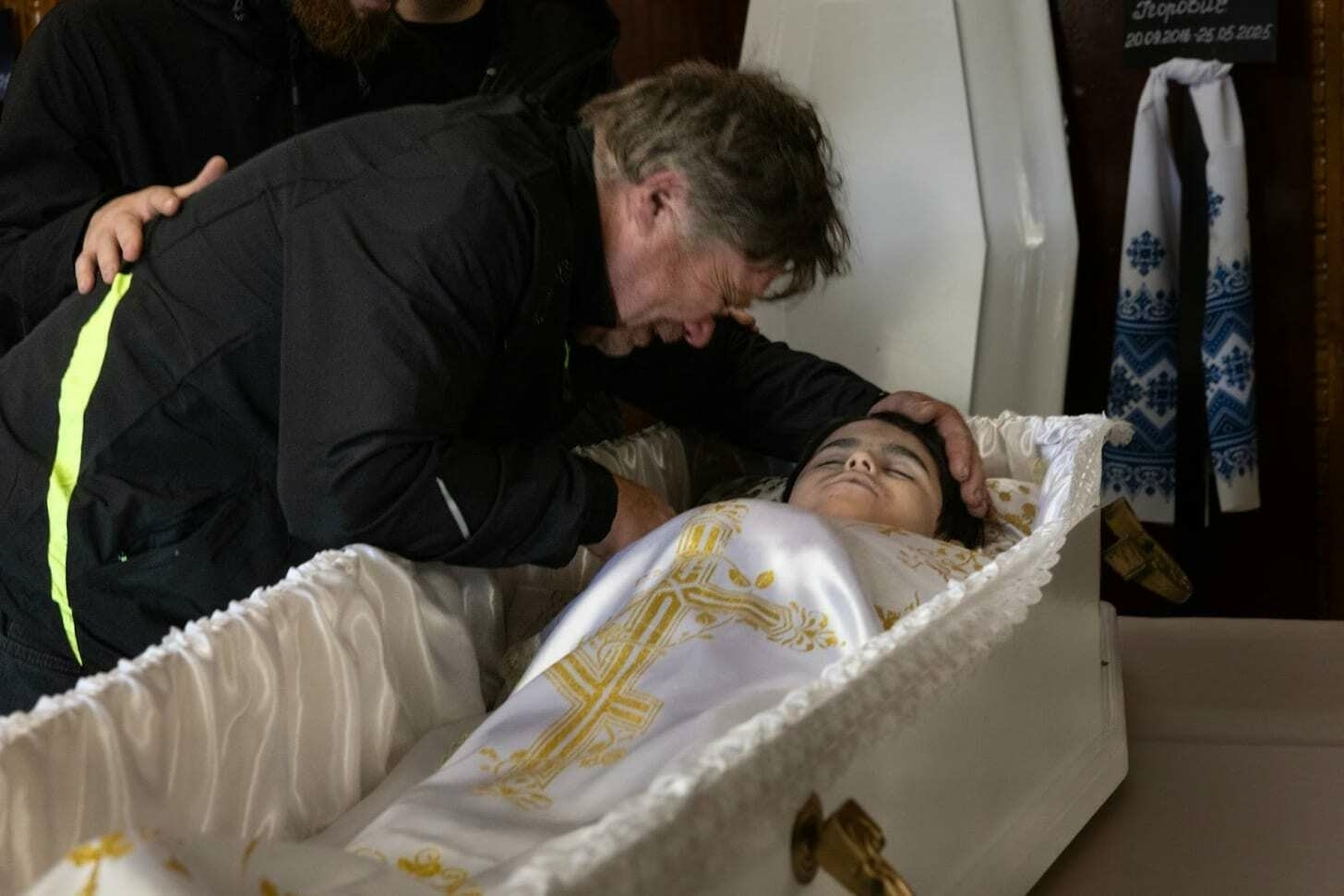
Ihor Martyniuk says goodbye to his daughter Tamara who was killed along with his two other children when Russia launched a massive aerial attack on May 25th across multiple cities. Photo by Paula Bronstein/Getty Images. Many mothers faint or become hysterical. Anna, Olena’s colleague, advises always having a doctor nearby.
“When the coffin is closed, parents realize that this is the last moment they will see their child. And that is the most terrifying,” she added.
The possibility of physical contact disappears, Yana Hryvchuk explained. After that, parents cannot touch their child or talk to them. All they have left are memories.
The grim job continues, even accelerates, as the number of attacks on civilians in Ukraine increases. The past spring has been an ordeal.
Olena reasons this is where she’s meant to be in her life.
If she can’t save the children who’ve been killed, she can at least ensure they are given a dignified final journey.
NEWS OF THE DAY:
By: Mariana Lastovyria
Good morning to readers; Kyiv remains in Ukrainian hands.
KYIV STRIKES 4 RUSSIAN BOMBERS: Ukraine’s Special Operations Forces, the Security Service of Ukraine (SBU), and other army units carried out a strike on the Marinovka airfield in Russia’s Volgograd region, located in the country’s southwest.
The long-range drone attack damaged two and destroyed two Su-34 aircraft — Russia’s main tactical bombers used to target Ukrainian military positions and frontline towns. These aircraft are typically used to drop guided aerial bombs.
The move follows the much-discussed ‘Operation Spiderweb,’ which involved drone strikes on Russian strategic bombing capacity.
BALTICS TO WITHDRAW FROM ANTI-PERSONNEL MINE TREATY: Estonia and Lithuania have notified the United Nations of their decision to withdraw from the convention banning anti-personnel mines, according to European Pravda.
The change comes amid growing threats of a potential Russian attack. The withdrawal will take effect six months after the formal notification is submitted to the UN.
UKRAINE USING 40 PERCENT LOCALLY PRODUCED WEAPONS: Ukraine now supplies over 40 percent of the weapons it uses in the war against Russia domestically, Zelensky said. This includes drones used to strike both along the front line and deep inside Russian territory.
Currently, Ukraine has the capacity to produce around 4 million drones annually, a number that could double, according to Zelensky. However, Kyiv lacks sufficient funding from Western countries to scale up production.
KITTENS OF WAR:
Mariana’s mother was given two tiny kittens to keep them warm and feed. But her family didn’t get a chance to take them home, as there were too many volunteers eager to adopt the kittens!
Stay safe out there!
Best,
Artem -
Ukrainian drone strike on Crimea air base destroys 3 Russian helicopters, SBU claims
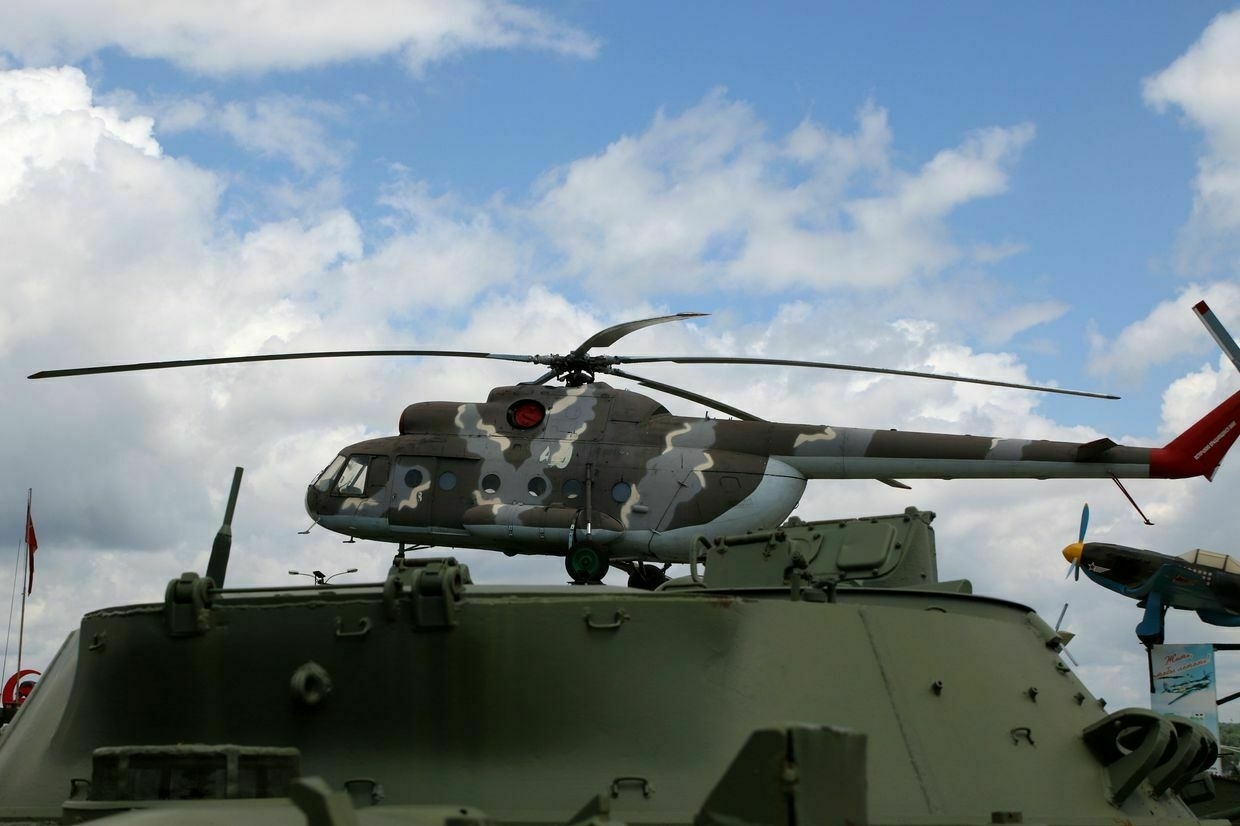
Editor’s note: The previously published footage, provided by an SBU source, was allegedly related to a different operation and was deleted after the mistake was identified.
Drones operated by the Security Service of Ukraine (SBU) struck the Kirovske military airfield in occupied Crimea overnight on June 28, the SBU told the Kyiv Independent.
The attack destroyed Mi-8, Mi-26 and Mi-28 attack helicopters, and a Pantsyr-S1 self-propelled anti-aircraft missile and gun system, the SBU claimed.
According to the SBU, Ukraine targeted Russian aviation, air defense systems, as well as ammunition, reconnaissance and attack drones storage facilities.
Secondary explosions were heard at the airfield during the night.
The Kyiv Independent could not verify these claims.
As Russia intensifies aerial attacks on Ukraine and the civilian death toll climbs, Ukraine has stepped up its drone attacks on Russian territory too.
Earlier on June 27, Ukrainian drones struck four Su-34 fighter jets at the Marinovka airfield in Russia’s Volgograd Oblast, according to the military.
Preliminary reports indicate that two Russian fighter jets were destroyed in the June 27 attack, and the other two were damaged. Russia uses the aircraft to bomb Ukraine.
Since the start of its full-scale war in February 2022, Russia has lost 420 airplanes and 337 helicopters, Ukraine’s General Staff said in its latest update on June 28. The Kyiv Independent could not verify these figures.
Ukraine war latest: Ukrainian drones reportedly strike 4 fighter jets in RussiaKey developments on June 27: * Ukraine war latest: Ukrainian drones reportedly strike 4 fighter jets in Russia * North Korea deployed 20% of Kim’s elite ‘personal reserve’ to fight against Ukraine in Russia, Umerov says * Pro-Palestinian activists reportedly destroy military equipment intended for Ukraine * Zelensky signs decree to synchronize Russia sanctionsThe Kyiv IndependentThe Kyiv Independent news desk
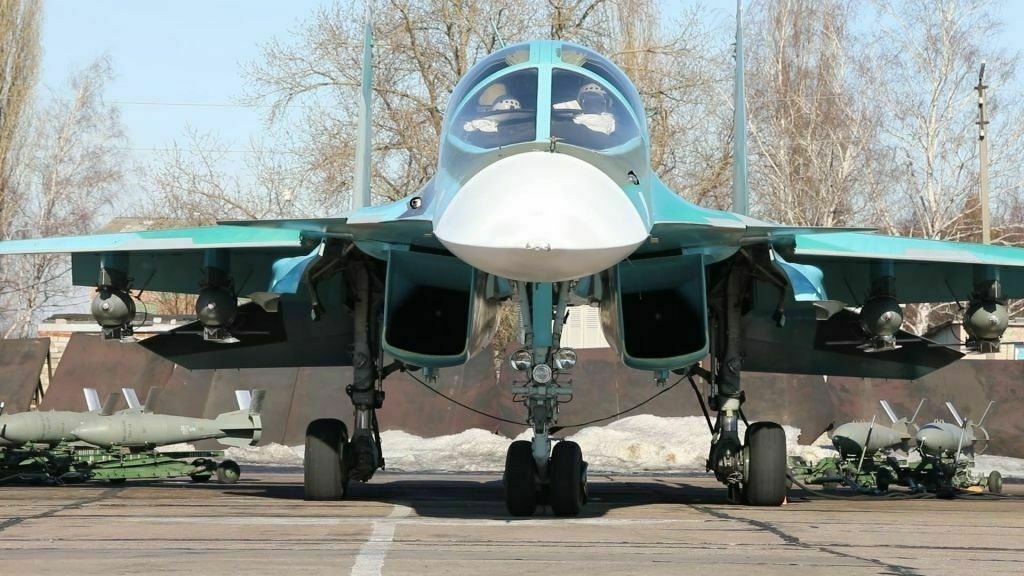
-
Russia revives obsolete T-62 tanks amid equipment shortages, Ukraine's intel claims
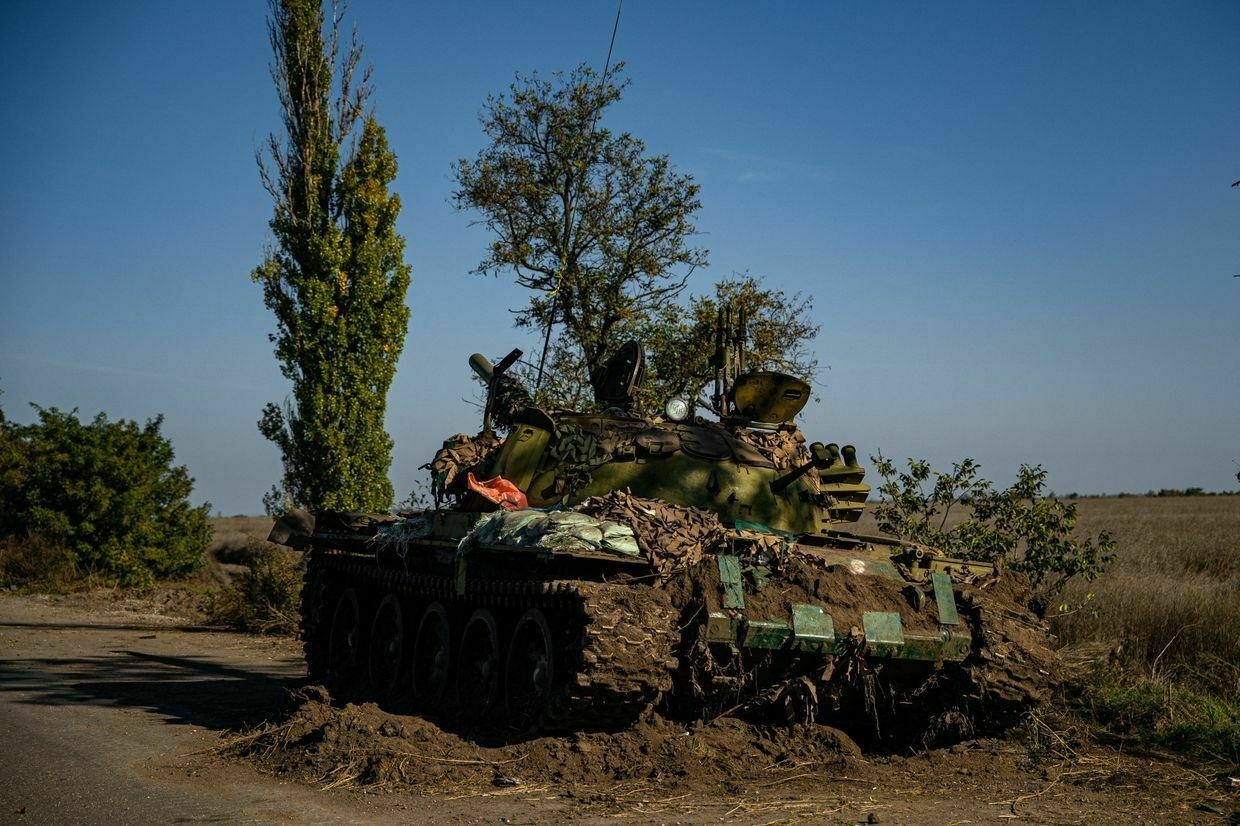
Russia is returning outdated T-62 tanks to service due to mounting equipment losses in its full-scale war against Ukraine and a shortage of modern military equipment, Ukraine’s military intelligence (HUR) said on June 28.
“The key factors limiting the ability to produce modern armored vehicles in Russia are a lack of industrial capacity and a shortage of imported high-tech components,” the agency said.
According to HUR, the restoration of T-62 tanks is primarily carried out at a facility in the village of Atamanovka in Russia’s far-eastern Zabaykalsky Krai.
Russia transferred 21 T-62 tanks from its eastern military district to the European part of the country, the intel claimed.
HUR said that Russia’s stockpile of Soviet-era tanks from the 1970s is being depleted, while most T-62s are even in worse condition after decades of open-air storage without maintenance.
Some of these tanks can also be used at the front as stationary firing points to reinforce defensive positions.
“Due to a severe shortage of modern main battle tanks such as the T-90M and T-72B3M, the deployment of T-62s is seen as a temporary but necessary measure,” the statement read.
Since the start of its full-scale war in February 2022, Russia has lost 10,970 tanks, Ukraine’s General Staff said in its latest update on June 28.
The Kyiv Independent could not verify these numbers.
Ukraine war latest: Ukrainian drones reportedly strike 4 fighter jets in RussiaKey developments on June 27: * Ukraine war latest: Ukrainian drones reportedly strike 4 fighter jets in Russia * North Korea deployed 20% of Kim’s elite ‘personal reserve’ to fight against Ukraine in Russia, Umerov says * Pro-Palestinian activists reportedly destroy military equipment intended for Ukraine * Zelensky signs decree to synchronize Russia sanctionsThe Kyiv IndependentThe Kyiv Independent news desk
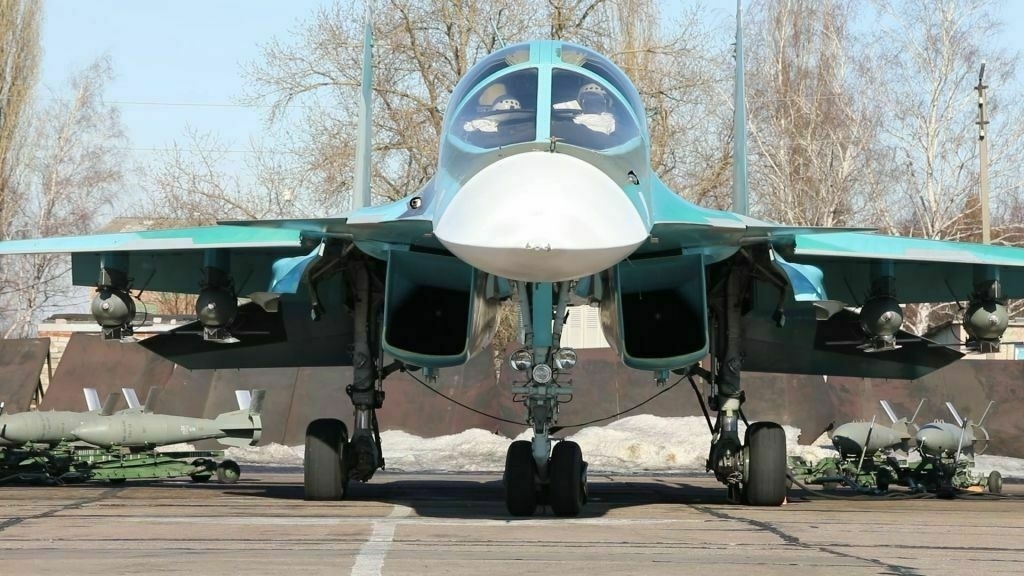
-
Ukraine downs new Russian Grom-1 bomb missile near Dnipro city, official says
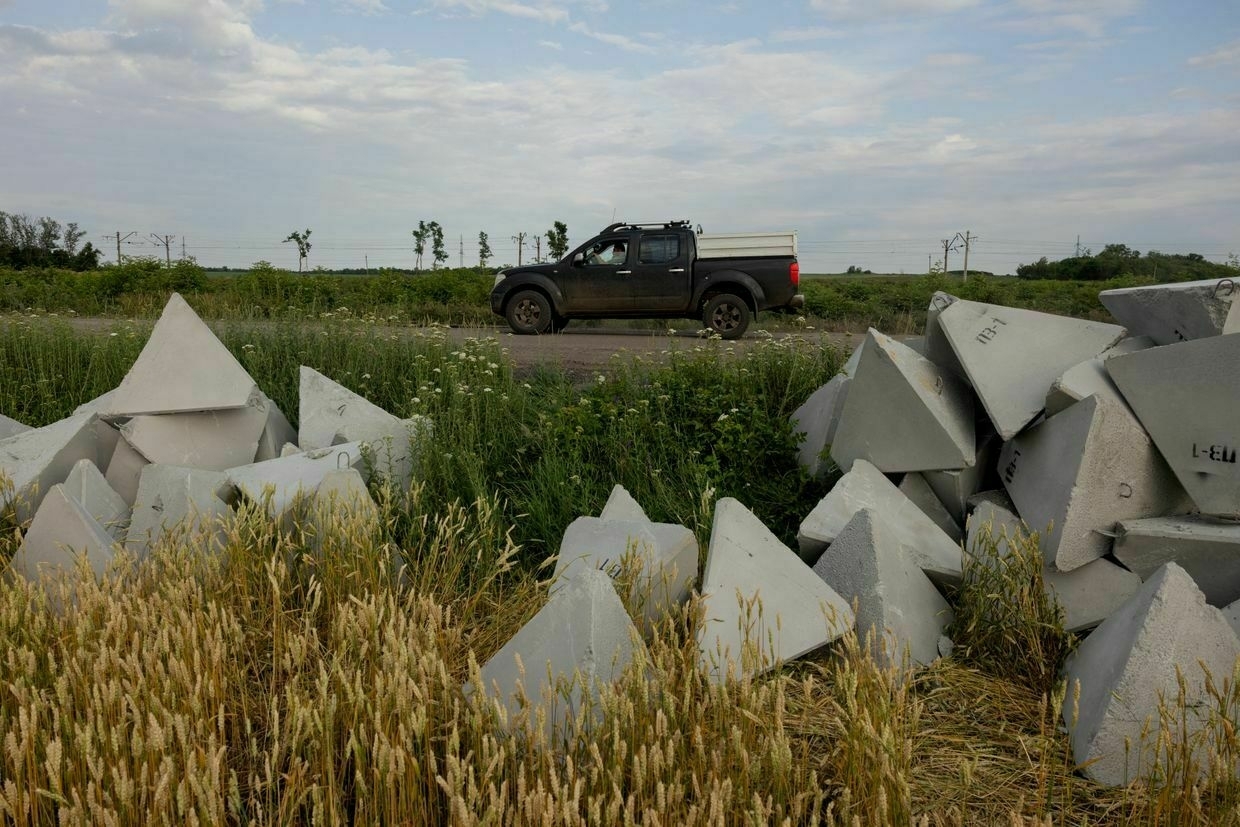
Russia launched its new Grom-1 bomb missile at Dnipropetrovsk Oblast for the first time on June 28, but it was shot down by Ukrainian air defenses, Governor Serhii Lysak said.
The attack comes as Russian troops continue their offensive in neighboring Donetsk Oblast, pushing closer to Dnipropetrovsk Oblast — a major industrial region in central Ukraine.
In mid-June, Ukraine’s military denied reports that Russian troops had entered the region, with President Volodymyr Zelensky saying that Ukrainian troops had intercepted Russian reconnaissance units attempting to breach Dnipropetrovsk Oblast.
Explosions in Dnipro were heard around 11:30 a.m. local time, shortly after the Ukrainian Air Force reported that Russia had launched guided aerial bombs.
The strike was later confirmed to have been launched from the Russian-occupied part of Zaporizhzhia Oblast.
“The target flew more than 100 kilometers and was shot down by air defense outside the city of Dnipro,” the statement read.
Authorities are verifying the wreckage of the downed weapon.
To date, neither Russian guided aerial bombs nor the Grom-1 bomb missile had previously reached the city of Dnipro.
The Grom-1 is described to be a hybrid of a guided aerial bomb and a missile, developed from the Kh-38 missile platform, with an estimated range of up to 120 kilometers.
Russia regularly uses guided aerial bombs to attack front-line areas in Ukraine’s east and south, as well as regional centers such as Kharkiv, Sumy, and Zaporizhzhia.
As Moscow intensifies its attacks on Ukrainian cities, earlier this week on June 24, Russian forces struck civilian infrastructure and a passenger train with ballistic missiles, killing at least 21 people and injuring more than 300 others.
Russia has amassed 111,000 troops near Pokrovsk, Syrskyi saysPokrovsk remains the “hottest spot” along the front line but “the situation is under control” and Russia has not crossed the administrative border from Donetsk to Dnipropetrovsk Oblast, Commander-in-Chief Oleksandr Syrskyi said.The Kyiv IndependentAbbey Fenbert
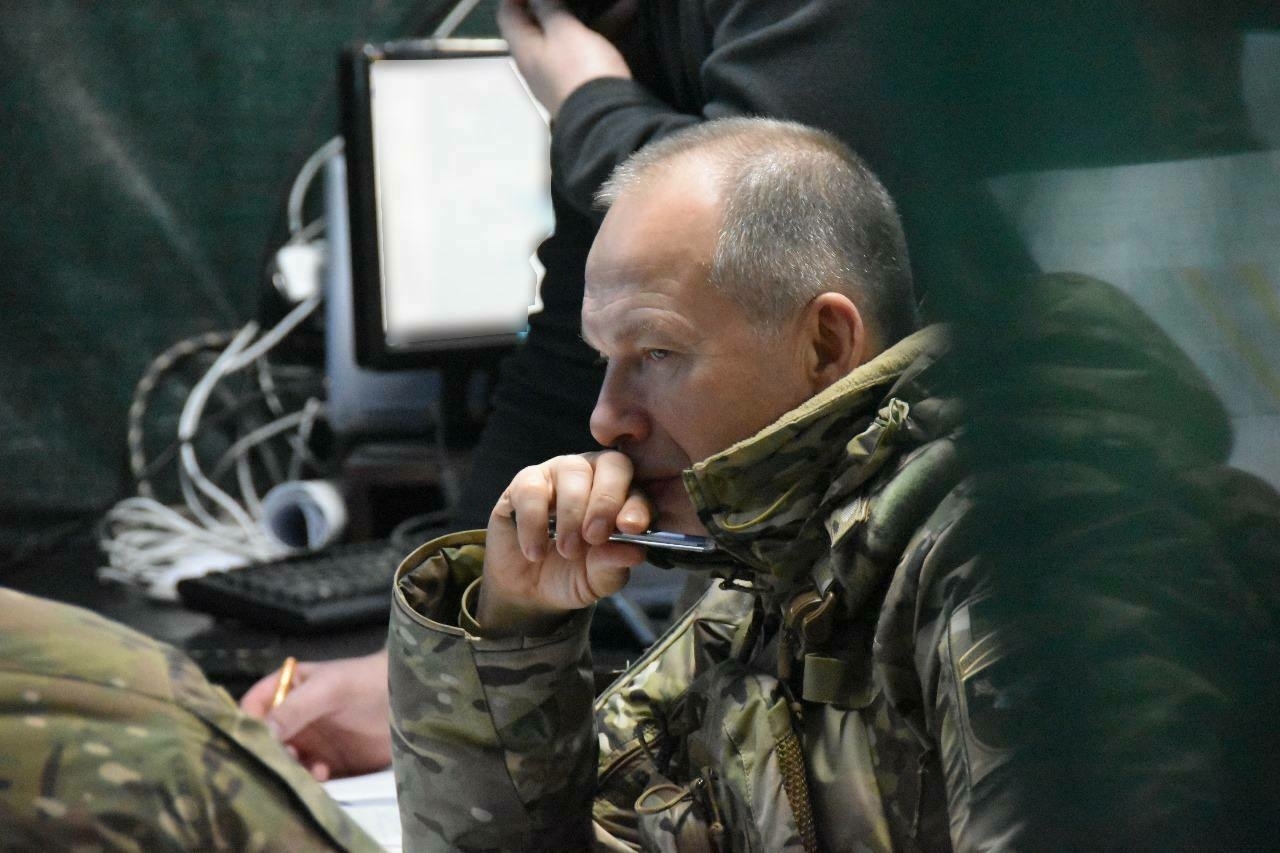
-
Pro-Ukraine partisans disrupt Russian military logistics in occupied Donetsk Oblast, group claims
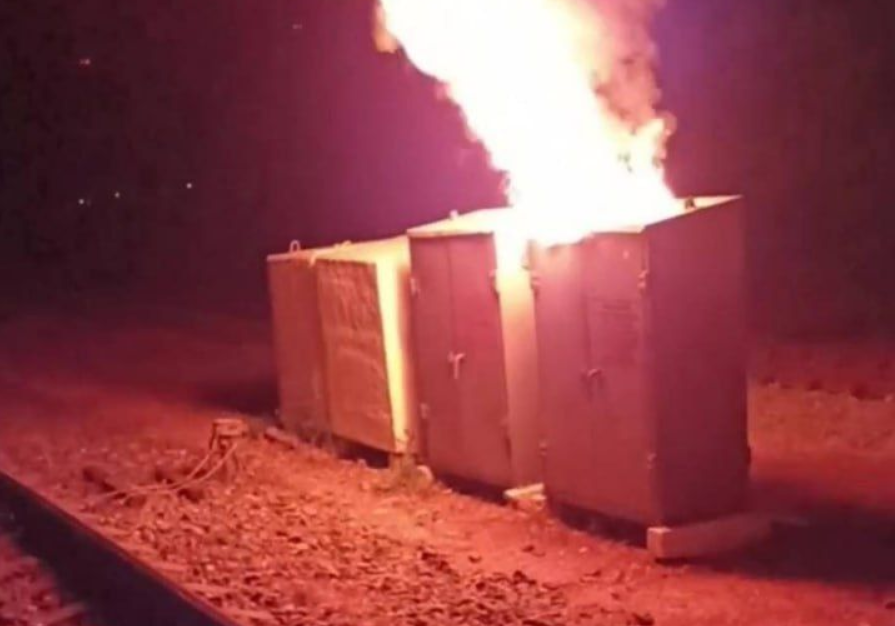
The Atesh partisan group set fire to a signal cabinet that helps control traffic on a railway line near the Russian-occupied city of Yasynuvata in Donetsk Oblast, a route used for Russia’s military logistics, the group claimed on Telegram on June 28.
Yasynuvata lies some 22 kilometers (12.5 miles) from the occupied city of Donetsk and is considered to be a major railway junction in the region.
According to the group, the sabotaged section is located near Russian military units, warehouses, and industrial facilities.
Atesh said the attack disrupted the delivery of a train carrying fuel for Russian forces.
“On Ukraine’s Constitution Day, we remind the occupiers that this is an independent and free country. And Donetsk will always be Ukrainian,” the statement read.
The Kyiv Independent could not verify these claims.
The Atesh partisan group regularly conducts sabotage attacks in Russia and Ukraine’s Russian-occupied territories.
In early June, Atesh claimed to have destroyed a signal cabinet on the new Volnovakha-Mariupol railway, which had been recently built by occupying Russian forces.
Ukraine war latest: Ukrainian drones reportedly strike 4 fighter jets in RussiaKey developments on June 27: * Ukraine war latest: Ukrainian drones reportedly strike 4 fighter jets in Russia * North Korea deployed 20% of Kim’s elite ‘personal reserve’ to fight against Ukraine in Russia, Umerov says * Pro-Palestinian activists reportedly destroy military equipment intended for Ukraine * Zelensky signs decree to synchronize Russia sanctionsThe Kyiv IndependentThe Kyiv Independent news desk
